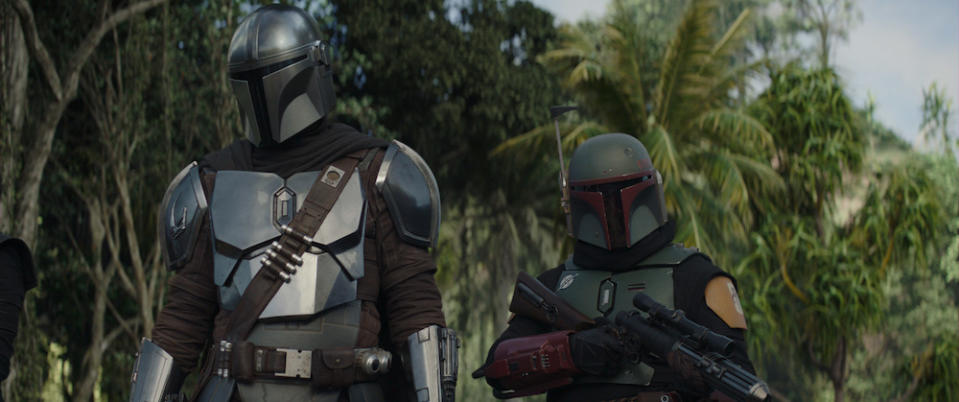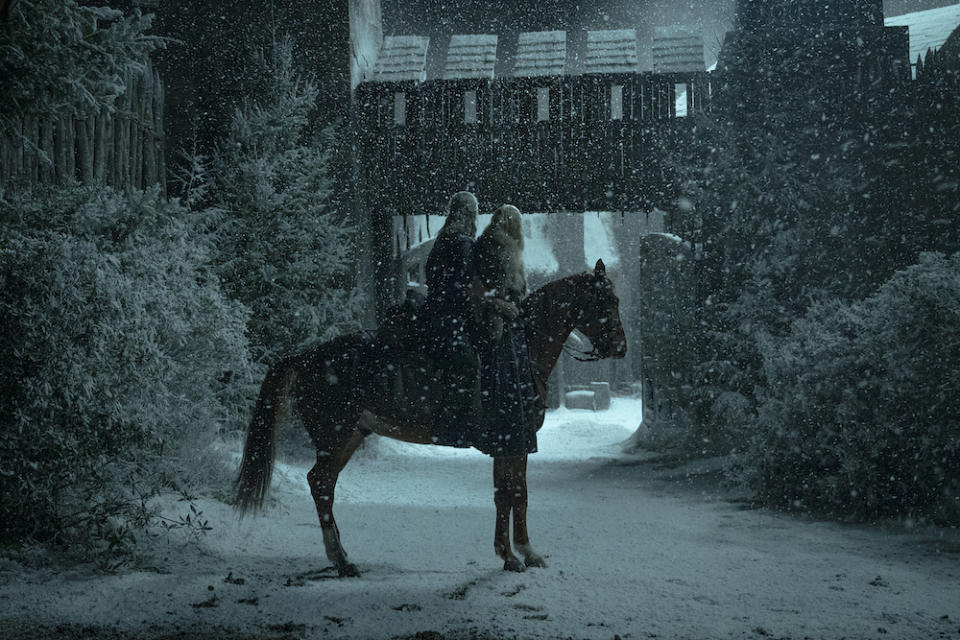TV’s IP Problem: How Reboots, Spinoffs, and Blockbuster Franchises Could Shape the Future


IndieWire turns 25 this year. To mark the occasion, we’re running a series of essays about the future of everything we cover.
For more than four decades, “Star Wars” has created a dazzling universe filled with iconic characters and stunning imagery — yet each story starts with a simple scroll. The onscreen exposition stretches out into the stars, and for a moment, it feels endless, as though you’ll simply keep reading for two hours rather than embarking on an interstellar adventure.
More from IndieWire
That’s how it felt last December, when Disney spokespeople made announcement after announcement during a four-hour presentation to investors, many of which focused on the further expansion of George Lucas’ blockbuster film franchise via Disney+. A new season of “The Mandalorian,” the debut Disney+ original series that became an instant sensation in November 2019, was given the go-ahead, along with a spinoff, the long-anticipated “Obi-Wan Kenobi” series, two animated shows, and more, totaling 10 new TV series in a galaxy far, far away.
Joining them was Patty Jenkins’ fighter pilot film “Rogue Squadron,” which notably anoints the “Wonder Woman” director as the first woman to direct a “Star Wars” motion picture. It was also the only “Star Wars” movie announced that day. Needless to say, the future of the “Star Wars” universe isn’t on the big screen. It’s on TV.
Today, TV does it all, and when it comes to scripted series, the small screen is seeing an influx of reboots, revivals, and sequels, some of which take the form of big-budget franchises. The streaming wars have created a number of new services, all angling for supremacy, and the easiest way to win is to offer audiences something they already know and want. Whether that’s the next piece of the Marvel (Not-So-)Cinematic Universe or an extension of “The Godfather” trilogy, awareness can be a shortcut to subscribers — or, at least, that’s the predominant thinking, backed up by a Brink’s truck of Hollywood cash.
But with so much being invested in franchises new and old, what does that mean for the future of originality on TV? How will an inundation of intellectual property affect the kind of stories that, not so long ago, produced a (second) Golden Age of acclaimed original programming? Most importantly, will there be room for unknowns to compete in a landscape packed with returning favorites?
The short answer is yes. But to get there, one has to reach the end of that oh-so-scary scroll.
Libraries Are the Future Battleground for All I.P.
As a creative property typically owned by a studio, network, or conglomerate, intellectual property has always been key to programming, but its currency has risen as companies put more and more emphasis on streaming services. For one, library content can draw subscribers. NBCUniversal put a ton of marketing (and cash) into “The Office” premiering on Peacock, WarnerMedia shot an entire reunion special to let people know “Friends” was streaming on HBO Max, and you had better believe Netflix will find fun ways to flag everyone’s attention before “Seinfeld” hits the service in October.
But some libraries are bought, some libraries are built, and some libraries are bought and built. “Seinfeld” is controlled by Sony Pictures Television, not some company with a parent-owned streaming platform. Other library content exists fully in-house: “Looney Tunes” is produced by Warner Bros., Warner Bros. is a subsidiary of WarnerMedia, and WarnerMedia has put a lot of money into HBO Max — which is why “Space Jam 2: A New Legacy” not only debuted on the service (and in theaters) but caught so much heat for plugging other Warner Bros. I.P. With that level of command, I.P. can be developed into new properties, which in turn can drive interest to original works and build excitement for upcoming sequels, spin-offs, or what have you.
In other words, why tell new stories (which people may not like) when you can just expand stories people already know and love?
“The easiest thing to do if you’re a studio is to pull from what you’ve already got — that’s kind of step one,” said Dave Heger, a senior equity analyst at Edward Jones. “With all the streaming services that come from more traditional media companies, [they start by saying], ‘Let’s take advantage of what we’ve got in the library and make that available.'”
In theory, that’s nothing new. Just because the motives are more obvious these days, it doesn’t mean the final products will be worse than before — after all, plenty of bad remakes and spinoffs have been dismissed by unsatisfied audiences. However, whether it’s good or not, there’s a lot more of it coming. Streaming has invited a concentrated focus on building brands through cinematic universes and popular franchises. Just take a look at the aspiring hits around the corner.

Courtesy of Disney+ and Lucasfilm
Every Past Hit is a Template for a Future One
Beyond all the new “Star Wars” series, Disney+ is a streamer built on the back of its preexisting titles. Everywhere you look, something old is being refurnished. The service’s first two original series were “The Mandalorian” and “High School the Musical: The Musical: The Series” (a mockumentary spinoff of the Disney Channel movies). The streamer’s next original is “Doogie Kameāloha, M.D.,” based on the early ’90s ABC show produced and distributed by 20th Century Fox Television, which is now owned by Disney. In between, there were more franchise extensions (“The Mighty Ducks: Game Changers”) and serialized sequels (“Turner & Hooch”), but what’s driven the most conversation — and, presumably, steady subscriber growth — is the MCU. Marvel’s Disney+ series “WandaVision,” “The Falcon and the Winter Soldier,” and “Loki” all stem from decades-old comic books and two decades of Marvel movies.
Now, they’re leaving a major mark on television, and the MCU’s perceived success on Disney+ (based on the difficult-to-dispute success of Disney+ itself) has already altered the marketplace, encouraging streamers to mine their own library content to build buzz around new streamers. In February of this year, just over a month after “WandaVision” hit Disney+, Paramount+ announced plans for five new series pulled from the studio’s classic film library: “Fatal Attraction,” “Flashdance,” “The Italian Job,” “Love Story,” and “The Parallax View” are all being redeveloped into new series for the nascent streaming service, joining previously announced plans for a “Grease” prequel series and “The Offer,” a limited series about the making of “The Godfather.”
During their joint executive session at August’s TCA session, Paramount+ president and CEO Tom Ryan described ViacomCBS’ three streaming platforms — Pluto TV, Paramount+, and Showtime — as a “super funnel […] where each service feeds into the other, introducing and enticing consumers through promotions and bundling to drive subscriber acquisition, retention, and lifetime value across our streaming universe.”
He added that “we continue to focus on building out major franchises on the service.” Those include “Star Trek” (with six separate series on Paramount+ and more in development), “Halo” (which moved over from Showtime), and something called “the expanding Taylor Sheridan universe,” which involves the Kevin Costner drama “Yellowstone,” a spinoff, and more shows from the “Hell or High Water” writer.
Remakes, reboots, and spinoffs of older properties — where the title is unchanged or the core story is basically the same — typically draw the most ire from viewers, who’ve built up a healthy skepticism to seeing former favorites told over again. How could a new “Parallax View” live up to Warren Beatty and Alan Pakula’s original? Still, that wariness doesn’t always stop them from finding out, and it’s typically much easier to turn curiosity into commitment with fresher I.P., which is where ongoing franchises come into play.
TV has been building franchises forever, but there are still more of them these days, and they’re developing in different ways. Following the merger of Viacom and CBS, as well as the creation of its streamer Paramount+, the premium cable network-turned-streaming service Showtime — which is already known for keeping its original series around well after they’ve creatively peaked — is doubling down by greenlighting revivals of contemporary favorites like “Dexter” and “Ray Donovan.”
“We like nothing more than an ongoing series,” said Gary Levine, Showtime’s president of entertainment, during a recent press event. “If we’re going to invest our time, and the audience is going to invest their time, we love to take them for a long ride over many, many years.”
That statement followed the network’s unexpected renewal of “Your Honor,” a well-rated drama starring Bryan Cranston that was billed as a one-and-done limited series — until Season 2 was picked up. Similar franchising has been seen for years now. “Big Little Lies” is a prominent example, but the practice dates back to “Downton Abbey” — which was originally submitted at the Emmys as a limited series — if not further. While critics and audiences alike express frustration over not knowing whether the story they’ve just seen is over or just on pause, extending series is still a reliable way to keep audiences hooked… and subscribed. Extending current I.P. may be a more common business practice in TV, but it’s more crucial than ever with so much content available and so many new brands trying to make their mark.

Courtesy WarnerMedia
It’s impossible to talk about TV franchises without mentioning “Game of Thrones,” and when HBO’s highly lucrative adaptation of George R.R. Martin’s books ended in 2019, the network didn’t waste time figuring out the next chapter: Expected in early 2022, “House of the Dragon” will be the first official spinoff, but there are plenty more in development. Casey Bloys, HBO and HBO Max’s chief content officer, has insisted on preserving quality over quantity with the franchise — he even said “10 would be too many,” soon after Disney+ greenlit 10 new “Star Wars” series — but “Game of Thrones” is simply too big to go away, especially as HBO Max fights for its place among the must-have streamers.
Still, if you haven’t developed your own franchise worthy of expansion and you have all the money in the world, you can also just buy I.P. and build off its previous success. That’s what Amazon Studios did when it purchased the television rights to “Lord of the Rings” in 2017. Rather than hoe one of its original series would become the next “Game of Thrones,” the massive tech company simply bought a popular property just like it.
So What Hope Does Originality Have?
While it may feel like I.P. has infected every corner of your TV, there are still plenty of providers standing in opposition. Amazon, HBO, and more of the majors still release many high-quality originals, even if “Succession” and “The Underground Railroad” earn far less attention than their network’s respective franchises. Boutique streaming services like Shudder, Sundance Now, and Crunchyroll promote unique scripted programming, as does good ol’ PBS. BritBox and Acorn TV import originals from overseas, among others, and various free or ad-supported SVOD services collect more obscure titles. But those distributors aren’t trying to compete with TV behemoths so much as they’re trying to carve out their own space in between them.
Broadcast networks, for their part, are leaning heavily on live events, reality TV, and gameshows, while their scripted offerings resurrect old favorites (like “The Conners” and “The Wonder Years”), form a pipeline to fill their parent company’s streaming platform (ABC to Hulu and CBS to Paramount+), build off established franchises (like “NCIS” and the “Chicago” shows), or all of the above.
But two major players stand out for their dedication to new ideas: Apple TV+ and FX.
Back in November 2019, Apple TV+ premiered just 11 days before Disney+ debuted, and even then, the difference was clear. Disney+ entered the streaming wars with a vast, enviable library and a Star Wars series that quickly became a hit. At the same time, Apple TV+ was met with skepticism and doubt; the early batch of originals were far from perfect, and there was no library content to fall back on. Throw in accessibility and marketing questions, and the long-term viability was unclear at best. But two years later, the $4.99 service has gone from dud to stud, and it’s done so with originals.
“Apple’s unique in a few different ways,” said Brad Gastwirth, Wedbush Securities’ chief technology strategist and an expert in tracking and predicting streaming developments. “One, I think they like creating their own content and being the producer rather than being the copier.”
While Apple has been tied to discussions about acquiring various legacy properties — from “Mad Men” to James Bond — the company has doubled down on its commitment to original programming. At an executive level, the Apple hired legendary HBO chief Richard Plepler to develop new content, and on a public level, the recent Apple TV+ ad campaign stresses that all it needs are originals. Some have argued Apple will eventually be forced to scale up by investing in library content or building franchises, if it hopes to compete with other streamers. After all, HBO still makes plenty of top-tier original stories, free from I.P. — it just also reboots “True Blood,” revives “Sex and the City,” and hitches its streaming wagon to stuff like “Space Jam 2,” which may as well be subtitled, “Here’s What’s on HBO Max.”
“Over time, building a reputation around original stories is [one way] to really differentiate themselves,” Heger said, citing HBO’s early days as a prime example. “But that was a completely different model, where they were also partnered with the cable companies. With Apple, you have a streaming service where it’s butting up against a bunch of other streaming services. All original content by itself might not be enough to get to that type of a large critical mass — to reach a 100 million-plus subscribers.”
Disney+ reached that number in record time, but one of its sister networks is also still primarily focused on original series. FX, which is now a subsidiary of Walt Disney Co., remains committed to the brand it established long before the Mouse acquired Fox — even as it releases more programs than ever.

Kurt Iswarienko / FX
FX Chairman John Landgraf said at a recent press conference that the company was ramping up production on 30 new shows per year. “FX built a distinctive brand of quality, one that we know has value to consumers who are navigating the overwhelmingly amount of choice available in the streaming era, and we know that because we’ve done a lot of research which validates that statement,” he said.
FX doesn’t ignore I.P. so much as it crafts originality within existing equations. Two of the network’s biggest hits are “American Horror Story” and “American Crime Story,” but they’re anthology series that change casts and stories every season. “Fargo” does the same, and its debut wasn’t a retread of the Coen brothers’ film — Noah Hawley wrote an original story indebted to the movie’s setting, style, and point of view.
Now, Hawley is working on another piece of IP for FX: the “Alien” franchise. Given the timing — Disney owns FX, which has a streaming partnership with Hulu, which means FX has more access to preexisting properties — could adding an “Alien” TV show be seen as the start of something? Might the IP-happy parent company be pushing for more franchises from FX?
Not yet.
“You’re being given access to a really precious resource when you’re granted access to such an important piece of IP,” Landgraf said at the conference. “And it’s not something FX does a lot of. So the answer is, no, there’s not another really key piece of Fox or Disney IP that we’re working on right now. There are other things like ‘Shogun’ which might be familiar to you,” but that’s all. (If you need further evidence of the network’s investment in original stories, FX did just greenlight a new series from the people who made this.)
Hulu also invests in original stories, though its clearest success, “The Handmaid’s Tale,” has already set up a spinoff (“The Testaments”) and, aside from its partnership with FX (via FX on Hulu), it’s unclear how the service will be altered by Disney’s slow takeover (and ongoing dispute with Comcast). Despite its brand recognition and critical success, it’s Hulu’s primary competition as well as the industry leader in streaming that may forecast what’s next.
The One-Stop-Shop Sets the Rules
Some distributors lean on intellectual property. Others covet never-before-seen stories. Netflix not only wants both, it wants more. And it will for the foreseeable future.
“They have a lot of money, so they can throw a lot of spaghetti against the wall and see what sticks,” Heger said. “You’ll see a number of shows where they throw out eight episodes, and then it’s like, ‘Well, that didn’t work so well. So we’re not going to renew that.’ They’re willing to throw a lot of money around, and see what might work and what doesn’t.”
The company that started the streaming revolution did so with breakthrough originals — “House of Cards,” “Orange Is the New Black,” “Stranger Things” — and key acquisitions of legacy content, like “The Office,” “Friends,” and “Breaking Bad” (which was still airing on AMC when past seasons debuted on Netflix). Netflix programming formed a massive library so extensive it convinced consumers just about everything would eventually stream there. Plenty of folks still believe that today, even though Netflix’s acquired content is quickly departing the service for its parent company’s chosen streamer.
That loss has only motivated Netflix to build its own content library — and fast — but it’s not doing so simply with original content. A massive deal with The Roald Dahl Story Co. could create an unprecedented shared universe of children’s programming. “The Witcher,” based on the popular video game franchise, has already spawned two seasons and an animated movie. After the original “Avatar: The Last Airbender” animated series pulled in huge audiences, a live-action adaptation is in the works — and Netflix is applying the same strategy to “Cowboy Bebop” and Pokemon.

Susie Allnut / Netflix
In other words, Netflix is still making all types of television. It’s just assembling its I.P. in piecemeal, instead of making big acquisitions. “They need to spend and try to create, so I think they’re going to try everything,” Gastwirth said.
If Netflix is indeed trying to make everything — big shows, little shows, and everything in between — it offers a window into TV as a whole. Television, after all, contains a wide spectrum of choice, some familiar and some fresh. So as long as the demand for more content exists, there will be room for all types of shows: big and small, IP-driven and wholly original. And the peak TV boom isn’t going away anytime soon.
“[Streamers] need to have more content to attract the consumer outside of just one show,” Gastwirth said. “Even though it might’ve been a success, and Showtime might’ve done great with ‘Ray Donovan,’ if they just did [one season of] ‘Ray Donovan’ in 2022, is that enough to get people interested? No. They need to spend a lot more on other things, too.”
High Demand Could Help Originals Thrive
The demand for more to watch, no matter what kind, may help original series continue to thrive.
“All of this is actually very good for the content market,” Gastwirth said. “It’s bidding up older properties and [new] properties that have a lot of interest. They’re going to go for some very premium price points and premium valuations. But for original content, I think there’s more bang for your buck because you can always create all kinds of content with all different producers. And maybe some things don’t go well, but the ones that do, your return on invested capital is significantly higher.”
In the long run, franchises and reboots may just be the gateway into new streaming services. No matter how excited people are for “House of the Dragon,” it’s only going to take up 10 hours of their year. In between seasons, HBO Max subscribers will go looking for more stories, and that’s how the next “Game of Thrones” gets discovered.
“People may initially want to go to a platform because of the big-budget type of IP, but I think a lot of times once they’re there, then they look around and see what else is available,” Heger said. “And that’s where smart, smaller budget, original stories start coming through.”
So really, we just need to broaden the conversation. People can’t spend all their time re-watching old classics — give something new a try. Once you find a hidden gem, talk about about it. Get some word of mouth going. Don’t let the blockbusters suck all the air out of the room. TV doesn’t have to become monolithic. But that’s up to all of us.
Best of IndieWire
Every IndieWire TV Review from 2021 So Far, Ranked by Best to Worst Grade
When Chuck Jones Brought a Working Guillotine to Protest Disney’s Labor Policies
Sign up for Indiewire's Newsletter. For the latest news, follow us on Facebook, Twitter, and Instagram.

